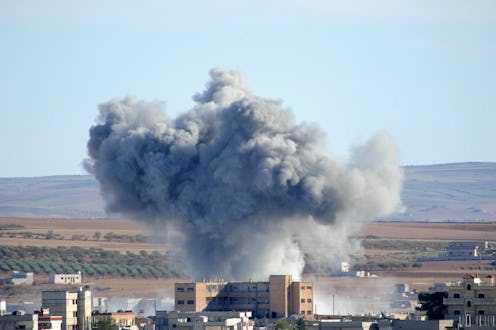News
This Is How ISIS Became So Powerful
Since the Nov. 13 attacks in Paris and the downing of the Russian airliner in Egypt, ISIS has become the most important enemy for France and Russia, largely aligning their goals with the United States. How did ISIS become so powerful that it could realign foreign policy of — for now— three of the world's largest militaries?
The organization started as an offshoot of an al Qaeda group in Iraq, but is now much more powerful. It was first named the Islamic State of Iraq and then a member of that group started a jihadi group fighting in the Syrian War in 2011 called Jabhat al-Nusra. It was supported financially by the Islamic State of Iraq and its leader, Abu Bakr al-Baghdadi. But eventually Baghdadi wanted to exert control over the Syria-based group, Jabhat al-Nusra, and the Islamic State of Iraq and Syria was formed.
Baghdadi's newly formed ISIS soon grew estranged from its al Qaeda roots as it tried to wrestle control in Syria from its own offshoot group Jabhat al-Nusra. ISIS and Jabhat al-Nusra began to fight over control in Syria, leading al Qaeda to denounce. Al Qaeda's leader Ayman al-Zawahiri disavowed any ties between the two groups and told Baghdadi to leave Iraq in 2014.
In the past year, ISIS has grown so strong that it has caused even al Qaeda to backtrack on its rejection of the group. In September al-Zawahiri has called on ISIS and Jabhat al-Nusra to work together in Syria fighting against the West and the Syrian government backed by al-Assad. His message, a recorded audio file also criticized ISIS but the overwhelming message was to seek unity.
ISIS has grown more powerful through money and the land it controls, where it can plan attacks with no Western power to stop it. In May The Guardian reported that ISIS controlled about 50 percent of Syria. They've been left unchecked to destroy ancient relics and their ever-increasing territory plays well when trying to recruit potential terrorists.
As for money, the group has amassed a small fortune, estimated upwards of $2 billion. Unlike past terrorist groups, ISIS has diversified its revenue stream. The majority comes from oil fields that the group controls, some of the largest reserves in the world. The group pumps oil, barrels it and then trades it on the black market over the border with Turkey. Other sources of funding come from selling antiquities, kidnapping foreigners, and taxing the residents of its territory.
The group will continue to see success until its territory is diminished and its sources of money are cut off. Russian, French and U.S. airstrikes have targeted ISIS strongholds and further coordination will make a difference. How far they can make it without troops being deployed will play a big role in the group's future.
